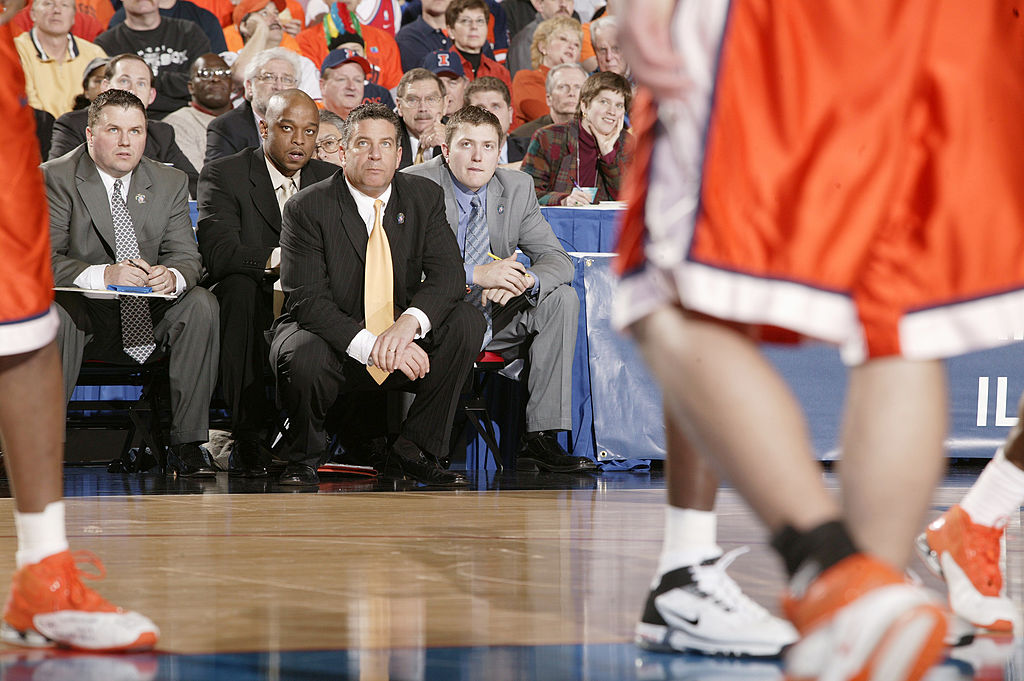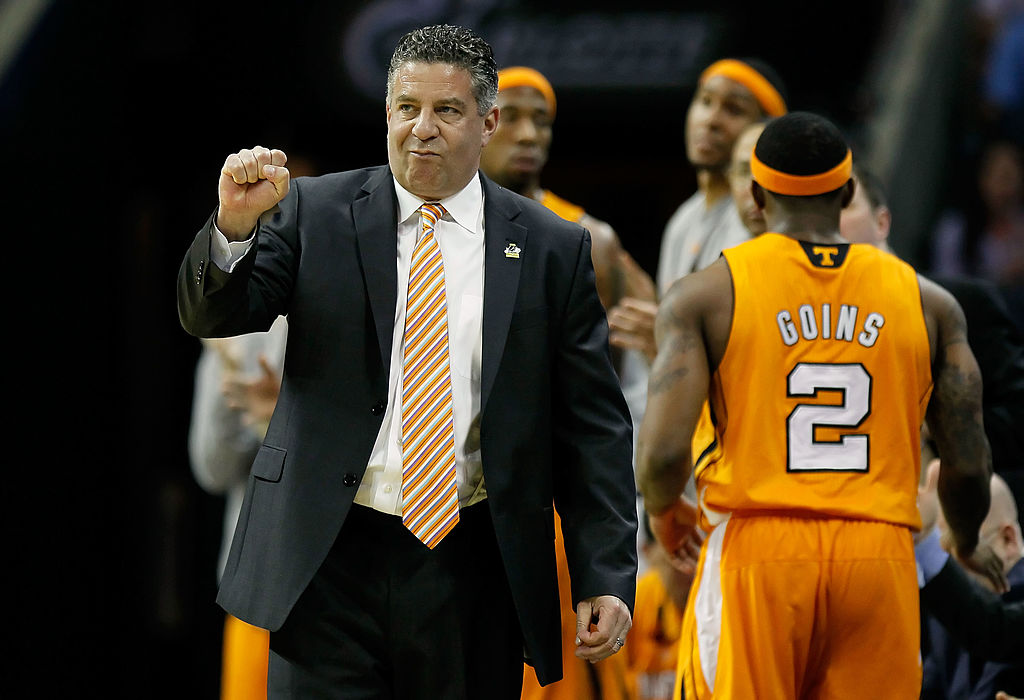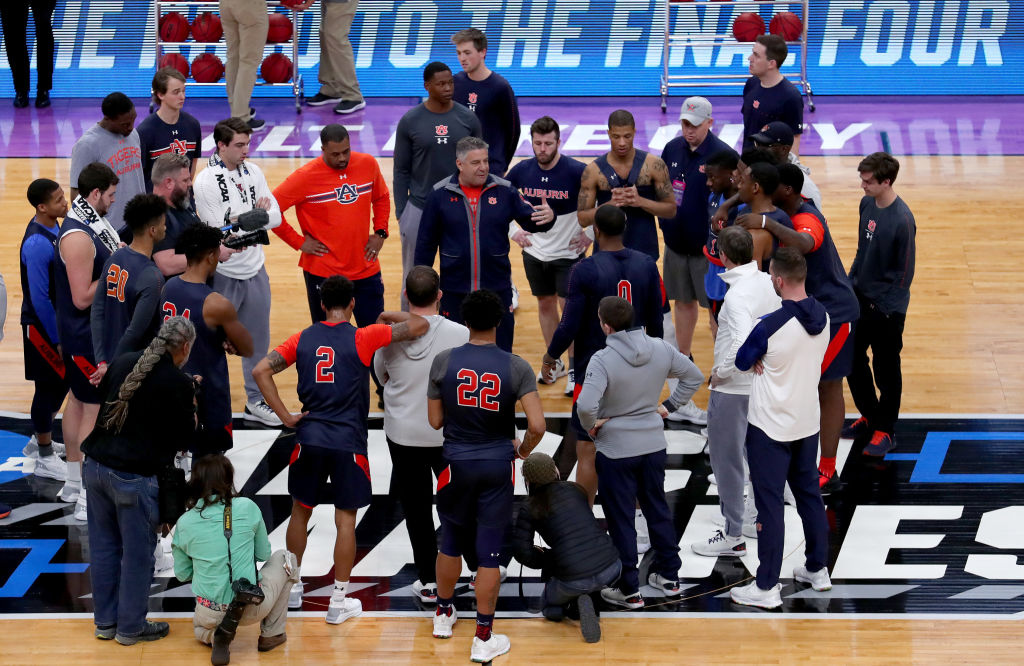Inside Bruce Pearl's recent contract dealings with Auburn, why personal relationships mean everything
AUBURN – Everything happened quickly for Bruce Pearl following Auburn’s defeat of Kentucky in late January.
The Tigers vaulted to No. 2 nationally, and with the win over ranked Kentucky, history was about to be made.
Two days later, Auburn earned the program’s first ever No. 1 ranking in the Associated Press poll. Five days after that, Pearl agreed to a contract extension that would keep him at Auburn through 2030, and raise his pay to $5.4 million annually with a $250,000 annual escalator.
That new pay change took effect on May 1. The numbers for Pearl’s staff haven’t been released, but his entire full-time coaching staff received significant raises as well. Steven Pearl, Wes Flanigan, Ira Bowman, Chad Prewett, Mike Burgomaster, Ian Borders, Marquis Daniels, strength coach Damon Davis, all of them.
Pearl’s unprecedented success was certainly part of the reason for the extension. The timing, however, was largely due to behind-the-scenes interest from at the time, Maryland and Louisville. Without that agreed upon extension, the list of suitors would have only grown.
Days after earning the No. 1 ranking, Bruce Pearl sat down with athletic director Allen Greene’s and started a simple conversation. Pearl didn’t want to leave Auburn, was in the middle of a historic basketball season at Auburn, but was receiving serious interest from other programs. Pearl made it simple.
“I went to Auburn and said, ‘I don’t want to go. I want to stay here and finish my career here. Look, I want to be loyal, but I want you to be loyal to me. Let’s do this,” Pearl told Auburn Live.
Within a matter of days, the deal was done.
The interesting part of the story is how Pearl handled his contract negotiation, and frankly, how he’s handled contract negotiations his entire career.
There were no sports agents involved in Pearl’s most recent contract extension with Auburn. There weren’t agents involved when Pearl first signed with Auburn in 2014, or when he accepted the job at Tennessee in 2005, or when he accepted his first Division I coaching job at Milwaukee in 2001, or even when he landed at Southern Indiana to start his head coaching career in 1992.
For Bruce Pearl, it’s all about personal, long-lasting relationships.
“I’ve always negotiated my coaching contract,” Pearl said. “I think the reason I’ve never had an agent speak for me regarding my contract is because of my personal relationship with every man that hired me.”
RELATED: Basketball Insider, looking at the roster after Johni Broome’s commitment
Where it all started for Bruce Pearl
When Bruce Pearl made the jump from an assistant at Iowa to head coach at Southern Indiana, he took a $40,000 pay cut.
“I imagine if I hired an agent, they could have gotten more out of them, but that’s not what I wanted to do to my boss. I wanted to earn the money I was being paid, and I wanted to give them a reason to pay me more every year without my agent asking for it. And we did that.”
Pearl killed it at Southern Indiana. He won 84 percent of his games, won a Division II national title, was runner-up another season, and finished first in the conference four different times. It was widely regarded as the best coaching job in Division II, where Pearl had his own television show, and was leading a program in the middle of basketball-crazy Indiana.
In 2001, things changed. Pearl also encouraged his players to be the best they can be, but he didn’t feel he was leading by example. By then, assistant coaches like Tom Izzo at Michigan State, Roy Williams at North Carolina, and Jay Wright at Villanova, had all moved on to become Division I head coaches.
“I got to thinking I was settling,” Pearl said. That’s when he made his big move.
Arriving on the national stage
What isn’t widely known is that Bruce Pearl interviewed at another Horizon League school before taking the job at Milwaukee.
The Butler job was available and Pearl interviewed, before the job ultimately went to Todd Lickliter. The position would have been in Pearl’s wheelhouse, only hours from Evansville, Indiana, where he was coaching at Southern Indiana. When Pearl didn’t get the job, he interviewed with Milwaukee, ultimately landing the gig.
Again, Pearl didn’t utilize an agent. He went into negotiations with Milwaukee wanting to start the relationship off the same he did at Southern Indiana. Pearl wanted the relationship to center around loyalty and being deserving. Pearl signed with Milwaukee for $115,000 annually – a nearly $80,000 pay cut from his position at Southern Indiana, where he increased his pay from an initial contract of $36,000 to $200,000 by the time he left.
Oh, and Pearl made Butler pay for their decision. Lickliter won zero conference titles at Butler, winning 68 percent of his games. Pearl won two conference titles at Milwaukee, winning 69 percent of his games. That’s when Milwaukee’s Sweet 16 appearance in 2005 caught Tennessee’s attention.

Enter close family friends, the Grubers
While at Milwaukee, Bruce Pearl started a relationship with a family that is now, well, like family. David and Nancy Gruber, and their son Steven, run an ultra-successful personal injury law firm in Wisconsin, Milwaukee. How successful? The Grubers own a stake in the Milwaukee Bucks and sit court side at every home game, if that helps answer the question.
David played basketball at Delaware during his college days, and Steven played basketball at Brown. In fact, Pearl coached Steven in the Maccabi Games, along with now head coach at Florida, Todd Golden. The Maccabi Games are competitions organized for Jewish and Israeli athletes every four years.
“The most important thing is that Bruce and his family are protected. That’s why we got involved in these things,” David told Auburn Live.
While at Milwaukee, the families became close, and when it was time for Pearl to move on to Tennessee, the Grubers took on an important role for Pearl. While no sports agents are involved and Pearl does his own negotiating, the Grubers come into play by simply helping look over Pearl’s contracts and make sure language, details, and everything else is in line. They don’t negotiate any monies for Pearl, simply serve as his legal advisors.
“It’s a tremendous situation for both folks. The decades of relationship makes it different and unique than your traditional agent relationship,” Steven Gruber told Auburn Live. “We cherish the relationship as much as we do the on-court success. The relationship goes much further than basketball. It’s decades long. It’s very personal to us. Number one ranking, Final Four, championships, it’s all amazing. But look what he’s done with the cancer game, raising funds for cancer, his involvement in the community, that sticks out. That’s the commitment he displays. He walks the walk. That always sticks out to me about he operates.
“The excitement and what that does to the community. They’re selling out, how that impacts restaurants, the student experience, those are things that matter to Bruce. He cares about it. It’s full circle. Coaching is tactician, recruiting, but it’s also being a leader for young men and a leader in the community. What’s happened to the Auburn community and how they’ve supported him, he’s tremendously grateful for. Auburn took a chance on him and he wants to do his very best to thank them every day for what they did for him.”
David remembers Pearl’s most recent discussions with Auburn and his truly life-changing contract.
“You have a school that wants him to be there. They want him to be on the level he deserves. He wants to be there. There’s a mutual desire to get there,” Gruber said. “He’s one of the top coaches in America, so that didn’t make it difficult. Bruce is an aggressive guy, he’s a fighter, but he’s all Auburn. I see how people feel about him down there. He’s a pretty darn good fit.
“We want to make sure that people are taking care of Bruce and his family. He tells me that’s what’s happening at Auburn. People have looked after him and that’s why he’s so comfortable there. It’s worked out quite well. Beneath it all, Bruce is a grinder, worker, he doesn’t take any shortcuts. People should respect that and you see the results.”
Career liftoff
Tennessee athletic director Mike Hamilton came calling on Bruce Pearl after that NCAA Tournament run in 2005. Pearl and Hamilton sat down in a room and Pearl asked, “what do you want to pay me?” Tennessee said they’d pay Pearl $750,000 his first year. Again, there was no discussion and no agents. Pearl accepted the deal.
“I wanted to make what the A.D. wanted to pay me, and I wanted the athletic director to want to pay me more every single year,” Pearl said.
During Pearl’s first season at Tennessee, they won 22 games, were ranked inside the top ten, and made the NCAA Tournament for the first time in five seasons. Following Pearl’s breakout season in the SEC, Hamilton called him into his office and asked Pearl, “what do you want?”
Top 10
- 1New
ACC Schedule
New format revealed
- 2
Jadan Baugh
Intel on Florida RB
- 3Hot
TJ Finley
To transfer to seventh school
- 4
Dylan Raiola
Plans to enter Transfer Portal
- 5Trending
DJ Lagway
Potential destinations for UF QB
Get the Daily On3 Newsletter in your inbox every morning
By clicking "Subscribe to Newsletter", I agree to On3's Privacy Notice, Terms, and use of my personal information described therein.
Pearl laughed, saying, “let me ask you something, where do you think Tennessee should finish in the SEC?” Hamilton responded, “top five.” So, Pearl said, “then pay me there. That’s what I want.”
That was Pearl’s second negotiation at Tennessee. Again, no agents. No hard ball. No back and forth. Pearl’s strategy of starting the relationship off with loyalty and trust again paid dividends. Pearl went on to win three SEC regular season championships and make a run to the Elite Eight during his time at Tennessee.

Auburn comes calling
Following three seasons out of college coaching and carrying a show-cause from the NCAA, then Auburn athletic director Jay Jacobs paid Bruce Pearl a visit while Pearl was doing college basketball coverage on television for ESPN. Jacobs made his pitch, but Pearl wasn’t convinced. The following day, Jacobs remained in Bristol, Connecticut and made yet another pitch. Pearl was warming up to the idea.
Pearl remembers telling Jacobs, “I still don’t know if I wanted to coach, but I promise you that if you do hire me, I’ll go to work every day rewarding you for that decision. I promise you’ll never regret it.”
Jacobs then asked Pearl, if he was offered the job, would he accept it? Pearl’s response: “no.” Jacobs was obviously stunned, but until Pearl traveled back home to talk to his family, saying yes to the position wasn’t going to happen, and Pearl still had to finish working the weekend at ESPN. Jacobs told Pearl the job might not remain open, but it was a chance Pearl had to take.
Pearl’s wife, Brandy, and his children congregated in Knoxville, Tennessee on a Monday morning.
“Sixty seconds of hugs and tears and they’re all in,” Pearl recalls. “We’re going to Auburn. They were pumped and ready to go. I called Jay and said, ‘do you still have a job available?’ Jay said, ‘I do.’ I told him, ‘well, you better get your a** to Knoxville and let’s get this done.'”
Jacobs flies into Knoxville and there, Pearl awaits. Once again, no agent anywhere in sight. Pearl remembers Jacobs asking about his representation and why none were present?
“I told them I do my own negotiating,” Pearl said.
Jacobs relayed to Pearl the initial pay structure and Pearl accepted. No questions asked.
“The point is, the money and the terms were what the boss wanted to pay me,” Pearl said. “I told Jay that I was going to give them reasons to pay me more. For the first couple of years, I didn’t do that. But, then, we saw what we hoped we’d see.”
Pearl knows the mistakes Chuck Person made and the involvement of the NCAA with the basketball program were a real problem. It was serious stuff. When it all began, then president Steven Leath and Pearl weren’t exactly on the same page. Pearl stood his ground with Leath, and remained the head basketball coach through the adversity.
“Auburn could have fired me,” Pearl admits. “It was on my watch, therefore, I’m responsible. I’m grateful to Auburn — Allen Greene at the time, our trustees, and again, I go to work and try and reward them for keeping me.”
Again, no agents. In 2018, when Auburn won the SEC regular season championship, Pearl’s coaching staff was the 13th-highest paid staff in the SEC. Following the season, Pearl and his staff didn’t ask for raises. Because of the NCAA happenings, they didn’t think it was prudent to bang that drum, so the pay remained the same.
“My assistants deserved a raise, but we thought it was the right thing not to take it,” Pearl said.
When Auburn won the SEC Tournament and made a historic run to the Final Four, they remained the 13th-highest paid staff in the league. Auburn was getting quite a bang for their buck at that point. Finally, Pearl received a new five-year deal that saw his pay rise to $3.8 million and escalate $125,000 annually. Auburn was finally in position to make adjustments to the pay, and yet again, no agents were involved.

The moral of Bruce Pearl’s story
For Bruce Pearl, there’s a reason this story, his story, is important to tell. By his own admission, and the admission of his friends and family, Pearl is a grinder, has a blue collar mentality, he only knows one way to work, and that’s really hard.
“I tell my players this story because I want them to know it wasn’t until I was 45-years-old where I got the first job that paid something,” Pearl said. “The reason I tell that story is I don’t want my kids to think I’ve always been in the position I’m in right now. And, for 45 years, I was nobody from nowhere. We had no money, lived in small houses, lived paycheck to paycheck. My kids did without, big time. There were things I couldn’t provided for my family.”
How times have changed for Pearl. In the final year of Pearl’s contract, he’s slated to be paid $7.4 million. That’s an astonishing number for Auburn’s men’s basketball coach, and something Pearl doesn’t come close to taking for granted.
“Blessed beyond what I deserved,” Pearl said. “I never dreamed all those years — and kept betting on myself and kept giving my athletic director to want to keep me and pay me more. No agents. That’s it.”
A new commitment
With Bruce Pearl’s most recent deal, there is clearly a commitment to basketball made by the Auburn administration that never existed before. Massive amounts of money being paid to Pearl and his assistants (who might still be underpaid), and now, the pledge to build a brand new basketball-only facility next to the current one that’s attached to Neville Arena. The new facility should be finished in under two years. There is a commitment on the NIL front to attract elite high school and transfer portal players, too.
“The Auburn folks made a serious commitment, and the Pearls, the staff, made tremendous commitments to the university,” the younger Gruber said. “It doesn’t go unnoticed. From Allen to Rich (McGlynn) to the president, all the people involved— everyone has been extremely professional and impressive.”
The game has certainly changed at Auburn.
“There is a new commitment to this,” Pearl said. “There’s a commitment. Since 2019, there’s been a shift. They saw what was possible. From the university, they’ve always been supportive, but since then they are committed to trying to be a top five program in the SEC.”